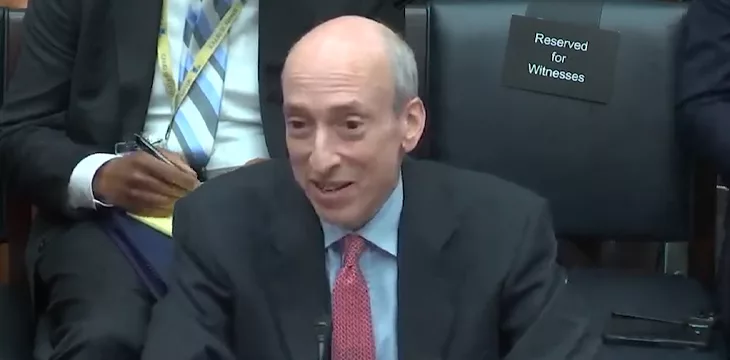|
Getting your Trinity Audio player ready...
|
Republicans remain furious with U.S. securities regulator Gary Gensler for refusing to cut ‘crypto bros’ a break.
On Tuesday, Securities and Exchange Commission (SEC) Chairman Gensler took a seat in the lions’ den, aka a hearing by the House of Representatives’ Committee on Financial Services. The hearing marked Gensler’s first appearance in front of the committee in 18 months, and many members chose to empty their entire buckets of long-stored grievances onto the impressively unflappable SEC chair.
While digital assets were only part of the hearing’s stated agenda, they took up a significant portion of the discussion. There was a noticeable partisan tilt to committee members’ tone, with more than one GOP’er querying Gensler on his stint handling the finances for Hillary Clinton’s failed 2016 presidential bid.
Gensler’s prepared statement largely echoed previously stated views, including the belief that “nothing about the crypto markets is incompatible with the securities laws” and “the vast majority of crypto tokens are securities.” As such, “it follows that many crypto intermediaries are transacting in securities and have to register with the SEC…It’s the law; it’s not a choice.”
Gensler added that the digital asset market “is rife with noncompliance. This noncompliance not only puts investors at risk but also puts at risk the public’s trust in our capital markets … Forsaking investor protection puts real people’s life savings at risk.”
Committee chair Patrick McHenry (R-NC) used his opening statement to take a stridently opposite view, saying the SEC had “refused to provide clarity” on digital asset regulation, opting instead for the alleged rule by enforcement route. McHenry noted irritably that the SEC was seeking an additional $78 million in funding to “expand your enforcement agenda.”
This “nonsensical” approach was not “sustainable,” and Gensler’s approach is allegedly “driving innovation overseas and endangering American competitiveness” (aka forcing scammers to go abroad if they wish to keep scamming).
McHenry said it was up to Congress to establish clear laws regarding digital assets and, while Gensler was expected “to play a constructive role in that process,” McHenry took issue with Gensler’s “overly aggressive and very expensive rulemaking agenda” and accused Gensler of “weaponizing” the SEC for his own personal agenda.
Good cops, bad cops
Rep. Maxine Waters (D-CA), the committee’s ranking member, offered Gensler a warmer welcome, reminding him that GOP committee members had previously vowed to do “a big number” on Gensler and his agency. “Today is the start of their making good on that promise.”
Waters applauded the SEC for “forceful actions” in going after “crypto criminals.” Waters claimed the SEC’s previous leadership took a “hands-off approach” to “mask noncompliance in crypto.”
Rep. Brad Sherman (D-CA) echoed Waters’ comments, applauding Gensler for “standing up to the crypto bro billionaires, where the multibillion-dollar frauds are just the beginning of the societal harm.”
When McHenry reclaimed the microphone, he noted former SEC director Bill Hinman’s statements that Ethereum (ETH) wasn’t a security. Last month, the head of the Commodity Futures Trading Commission (CFTC) said ETH was a commodity. Also, last month, the New York Attorney General said ETH was a security.
McHenry asked Gensler if ETH could be both a security and a commodity. Gensler replied that “actually, all securities are commodities under the Commodity Exchange Act (CEA),” unless it’s an excluded commodity that doesn’t fall under CEA rules.
A frustrated McHenry pushed Gensler to categorize ETH as either commodity or security. Gensler started to cite his view of what Congress intended when it passed securities laws in the 1930s, but McHenry demanded an either/or answer. Gensler insisted that it “depends on the facts of the law” and McHenry wouldn’t want him to “prejudge” this particular case.
McHenry claimed Gensler had previously prejudged BTC as a commodity, apparently referencing comments Gensler made to CNBC last summer in which he stated, “my predecessors and others have said [BTC is] a commodity.” Gensler was forced to remind McHenry that “my predecessors and the agency itself have spoken to that” rather than Gensler expressing his own view.
After allowing Gensler a little more time to distinguish between securities and commodities, Waters asked whether new crypto-specific laws were required. Gensler repeated that his agency had “the laws and the authorities to oversee crypto intermediaries.” Gensler added that he’d “been around finance for over 40 years in one way or another. I’ve never seen a field so noncompliant with laws written by Congress and affirmed over and over by the courts.”
Stablecoin guardrails
Rep. French Hill (R-AR) brought up the November 2021 President’s Working Group report, which “recommended that Congress enact legislation to establish a federal prudential framework for stablecoins.” (Hill’s emphasis.) Hill asked Gensler if he thought Congress has been “inactive” on this topic and whether he thought creating this framework was a good idea.
Gensler said care needed to be taken so that whatever regulations emerge don’t somehow undermine actually useful financial products like money market funds. Gensler also wants to ensure whatever emerges is subject to “guardrails,” so it doesn’t undermine efforts by the SEC/CFTC to target “fraud manipulation” in the crypto ecosystem.
Gensler attempted to reference the near-debacle caused by last month’s collapse of Silicon Valley Bank (SVB), where USDC stablecoin issuer Circle held $3 billion of its cash reserves in an uninsured account. (Fortunately for Circle, Uncle Sam bailed them out.) Tellingly, Hill verbally cut Gensler off at the pass and moved on.
Wednesday will see the same committee hold a hearing titled Understanding Stablecoins’ Role in Payments and the Need for Legislation. The hearing follows Sunday’s surprise filing of a new untitled discussion draft of ‘payment stablecoin’ legislation that builds on the bill introduced by then-Sen. Pat Toomey (R-PA) last December.
Regulation by (successful) enforcement
Gensler got some Dem backing from Stephen Lynch (D-MA), who noted that his GOP colleagues were simultaneously bemoaning the alleged lack of regulatory clarity regarding digital assets while criticizing the SEC’s rulemaking efforts in other sectors.
Lynch quizzed Gensler regarding the SEC’s crypto-related enforcement actions, allowing Gensler to point out that each case resulted from a vote by the five-member SEC. Moreover, each case produced a written decision—whether via settlement or court ruling—that provided what Lynch called “explicit guidance” for other firms.
Lynch found it odd that crypto firms were effectively unique in offering an amalgam of services that are ring-fenced in other financial sectors. Gensler agreed, saying the New York Stock Exchange isn’t running a hedge fund that trades on the exchange against other customers (without those customers’ knowledge).
Angry dads
Rep. Bill ‘Let’s Go, Brandon’ Posey (R-FL) lived up to his Florida Man designation by grilling Gensler on his alleged failure to prevent the failure of Sam Bankman-Fried’s FTX exchange. Many GOP’ers have latched onto a conspiracy theory that Gensler—who met with SBF in March 2022—was looking to shield SBF from regulatory oversight in order to give FTX a digital assets monopoly. Okay…
Posey asked Gensler how long after that meeting had he notified crypto investors of his concerns re FTX. Gensler spoke of the SEC’s need to hold information confidential in order to protect both the integrity of its investigation and the privacy of the individuals under investigation, so this is only made public if/when a settlement is reached or charges are brought. Posie responded with a sneering “Sad to hear that.”
The tension rose when Rep. Bill Emmer (R-MN) began giving off some serious Roland Friesler vibes. (Apologies for going Godwin here, but Emmer just kept shouting demands for yes or no answers and swiftly moving on to the next demand when Gensler kept trying to answer with some nuance.)
Emmer blamed Gensler for virtually every crypto failure that occurred over the past year or so, including Terra/Luna. Asked by Emmer whether he was trying to drive the crypto sector out of the U.S., Gensler said he was trying to drive them into compliance. If they weren’t complying with the laws, they shouldn’t be offering products to U.S. customers.
Emmer told Gensler his regulatory style “lacks flexibility and nuance. As a result, you’ve been an incompetent cop on the beat, doing NOTHING to protect everyday Americans and pushing American firms into the hands of the [Chinese Communist Party].” Emmer said Gensler’s mission to “put investors in harm’s way has been very apparent, sir.”
Bear in mind this is the same Tom Emmer who, in December 2021, publicly praised SBF for “doing a lot to make sure there is no fraud or other manipulation.” Also, the same month that Gensler met with SBF, Emmer co-signed a letter to Gensler telling the SEC to back off its investigations into crypto firms.
We’ve got our own no-win question for Emmer, for which he’s not allowed to offer any nuance, just ‘yes’ or ‘no.’ Tom, have you finally come to realize that SBF was doing lots of fraud and manipulation?
Friendly fire
Not all Dems were willing to let Gensler slide. Rep. Ritchie Torres (D-NY) wondered why, if international, unregulated firms like FTX were doing the most damage to U.S. customers, why not target more of those firms rather than U.S.-based exchanges like Coinbase (NASDAQ: COIN)? Why target Paxos but not Tether?
Gensler said the SEC’s jurisdictional reach applies to domestic and international firms if U.S. customers are accessing them. But “it takes longer to build the investigative files, it takes longer to cooperate with offshore enforcement authorities…and get subpoenas complied with.”
Things got back on the partisan track when Rep. Warren Davidson (R-OH) told Gensler he had a “record of failures to protect investors” and a “long series of abuses,” including “a Hotel California rule for crypto” that went unexplained. Davidson recently promised to introduce legislation to put Gensler out of a job, a bill that has zero chances of passing in the current Congress.
You’re ugly and your mama dresses you funny
After nearly four hours of testimony, the hearing was paused to allow committee members to participate in some House floor votes. When the hearing resumed an hour or so later, the bipartisan affair became a strictly GOP affair, with nine Republican members lobbying further questions/insults at Gensler.
Rep. McHenry returned for another kick at the Gensler, criticizing the SEC’s Staff Accounting Bulletin No. 121. That bulletin says it’s appropriate for entities looking to custody crypto assets to record both a liability and a corresponding asset on their balance sheets at the fair value of the assets.
McHenry said the rule “underestimates the effects” of such a requirement, which would effectively preclude banks from acting as digital asset custodians. McHenry said Gensler had failed to respond to a letter he wrote to the SEC on the subject on March 30, 2023.
McHenry said he’d “heard rumors that [Gensler] was not particularly interested in communicating with Congress” and threatened that, since “everyone on this dais represents America,” by ignoring his letter, “you are effectively ignoring the American people and make no mistake we will hold you accountable.”
Gensler said keeping crypto assets off balance sheets was “a recipe for further risk in the system.” Gensler pointed out that, if a company takes custody of a digital asset and then declares bankruptcy, “there’s no segregation…That’s very different than taking custody of public equities.”
The remaining interrogators took various potshots of dubious value, including Rep. Make Lawler (R-NY) saying Gensler’s “obfuscation is amazing. Congratulations.” When Gensler remarked that many of his personal views of digital assets have “continually evolved,” Rep. Erin Houchin (R-IN) said “vacillated” was more accurate.
Rep. Andy Ogles (R-TN) took issue with Gensler’s overall tone, saying, “if I wanted to hear preaching, I’d go to church. Spare me the preaching.” Ogles added that Gensler was either “unable or unwilling” to provide the answers Ogles sought, offering that “you’re either intentionally obstructing or you’re just not a good manager.”
Perhaps the best filter for viewing Tuesday’s ‘two minutes hate’ was the recent observation by freshman Rep. Jeff Jackson (D-NC), whose ‘angry politicians are faking it’ video went viral this week. However, just to be safe, Gensler should probably show up for his next hearing in a flak jacket.
Reaction
Bryan Daugherty, Global Public Policy Director for the BSV Blockchain Association, said Gensler’s “testimony and statements reflect the SEC’s commitment to enforcing laws and regulations affecting the crypto industry. However, I do believe that the recent oversight hearing fell short in a couple of ways. The lack of discussion on the distinction between blockchain technology and cryptocurrencies, regulatory frameworks for non-financial blockchain applications, and potential risks and challenges of integrating blockchain technology into traditional financial systems is an area where we must continue to advance the conversation.”
Daugherty expressed hope for continued discussion of “what measures are needed in order to encourage responsible innovation, while at the same time protecting investors and maintaining market integrity. It is essential for the SEC to address the risks associated with stablecoins and bad actors in the industry to ensure consumer protection.”
Follow CoinGeek’s Crypto Crime Cartel series, which delves into the stream of groups—from BitMEX to Binance, Bitcoin.com, Blockstream, ShapeShift, Coinbase, Ripple,
Ethereum, FTX and Tether—who have co-opted the digital asset revolution and turned the industry into a minefield for naïve (and even experienced) players in the market.

 09-18-2025
09-18-2025 





